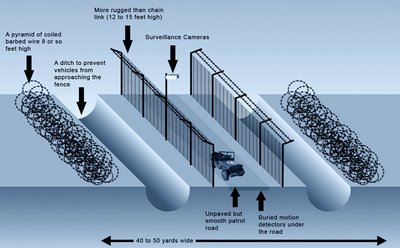 Image Cerdit: The Minuteman Civil Defense Corps Fence Project
Image Cerdit: The Minuteman Civil Defense Corps Fence ProjectWhen is an illegal immigrant crackdown more like the response to a natural disaster than the enforcement of laws? When the Department of Homeland Security (through its sub-agency ICE, this time) responds ineffectively to a situation that requires FOLLOWTHROUGH, that's when!
Last week, ICE (the Department of Homeland Security's Immigration and Customs Enforcement department) rounded up almost 1,200 illegal immigrants and seven current or former managers at a Netherlands-based firm that hired them. They were arrested, and most were released on a "notice to appear".
This action has no follow-through. Where does this government think these released individuals are going to go? They all are proven lawbreakers and immediate action is required.
Excerpted opinion from the New York Post -
A 'CRACKDOWN' THAT WASN'T
DUBYA'S IMMIGRATION ARRESTS
By JOHN O'SULLIVAN
April 25, 2006 -- IT happened last Wednesday, and it was nicely timed.
One week later - about now, in fact - the U.S. Senate was scheduled to reconvene to discuss an immigration bill. The bill proposes to amnesty most of the 12 million illegal immigrants in the U.S. and to admit millions more legally as guest-workers. The controversial measure is strongly promoted by the White House and both party leaderships in the Senate - but opposed by most Republican congressmen and a large majority of voters.
Something was needed to break the log-jam of opposition.
And last Wednesday federal agents "swooped" on plants in 26 states belonging to IFCO, a U.S. subsidiary of a Dutch firm supplying wood pallets and plastic containers to industry, and arrested 1,187 illegal immigrant workers. Seven former and current IFCO managers were also charged with employing illegal aliens. The next day, Homeland Security czar Michael Chertoff held a press conference to stress that such tough enforcement of immigration law, internally as well as at the border, would now be the rule.
Having established its willingness to crack down on illegality, the administration's political machine crossed its fingers and hoped that this display would now help passage of the "Not an Amnesty" law.
All this was not only timely; it was powerfully symbolic. What it symbolized, however, was not the tough enforcement of immigration law but its colander-like leaky ineffectiveness.
For even before Chertoff had spoken (but not before blogger Michelle Malkin had predicted it), four-fifths of the illegals arrested had been . . . released.
--
I recently suggested - wrongly - that there had been little or no enforcement of employer sanctions since the passage of the 1986 amnesty law; that, once an illegal reached a major city such as Los Angeles, Phoenix or Chicago, he was safe from official interest and could work unmolested. That was not quite accurate. The Clinton administration in fact managed some (albeit patchy) "internal" enforcement of employer sanctions. For instance, the period 1995-1997 saw 10,000 to 18,000 worksite arrests of illegals a year. Some 1,000 employers were served notices of fines for employing them.
Under the Bush administration, however, worksite arrests fell to 159 in 2004 - with the princely total of three notices of intent to fine served on employers. Thus, worksite arrests under President Bush have fallen from Clintonian levels by something like 97 per cent - even though 9/11 occurred in the meantime.
In this dramatic relaxation of internal enforcement is the explanation of the rapidly rising estimate of immigrants living and working illegally in the United States - up by more than a million in just the last year. For if people know that they are likely to be safe from enforcement once they escape the border area and reach L.A. or Chicago, then they'll keep trying even if they were caught and returned to their country of origin any number of times.
Porous borders are not only the cause of uncontrolled immigration; they are its result. You cannot control the borders, however many patrols you hire or fences you build, if you grant an effective pardon to anyone who gets a hundred miles inland. It's as simple as that.
--
If the law were enforced more uniformly - rather than with the current 159 worksite raids and three employer fines - then the number of people deported would rise substantially even if (as last week) only one-fifth of those detained were eventually sent back over the border. It would send a message to those considering illegal entry that they could no longer depend on legal immunity and secure employment once inside America. Those illegals already here, finding their opportunities drying up, would have an incentive to return home legally even if only to increase their chances of legal immigration later.
These changes would occur gradually, allowing businesses to adapt to the tighter labor market. And the border would, seemingly by magic, become less porous as interior law enforcement reduced the incentive to cross it.
This is called "the attrition strategy" by Mark Krikorian of the Center for Immigration Studies. It is far more practical than the either an amnesty or a guest-worker program. And it requires neither legislation nor official game-playing to implement it.
By contrast, every time the unpopular Bush-Senate "compromise" bill meets an obstacle, Karl Rove will have to pick up a telephone and utter the famous line from "Casablanca": Round up the usual suspects.
Read All>>
This "attrition strategy" sounds like a good step but first we need to show that we are serious about attaining respect for our immigration laws and our border.
PUT UP THE FENCE ... deport found illegals ... deeply fine companies hiring known illegals.


No comments:
Post a Comment